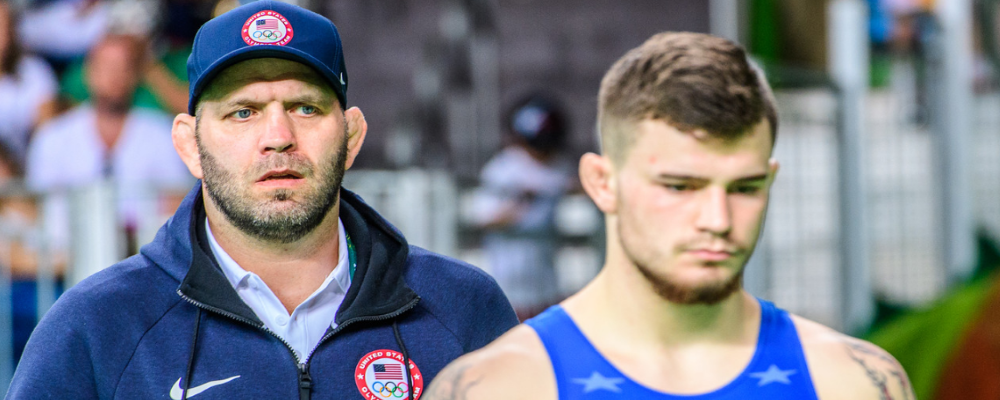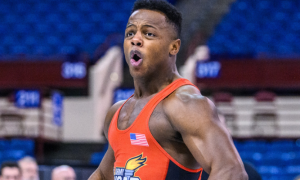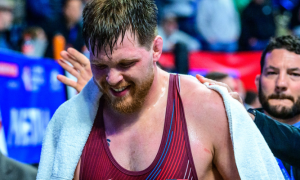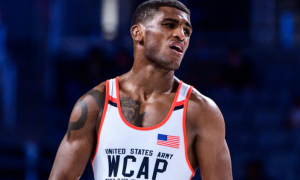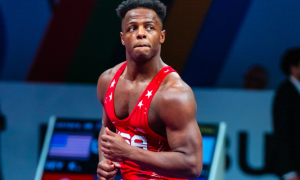Since the news dropped officially yesterday regarding United World Wrestling’s removal of forced par terre, the response has been pretty mixed. Many American fans and coaches are a bit apprehensive, fearing that scoring will be even more at a premium or that officials will still play too large of a role in the outcome of matches. US Senior Greco Roman athletes are by and large heavily in favor of the rule update, intimating that they see it as a fortuitous turn of events. The coaches seem to have a more balanced perspective, though it is hard not to notice that they, too, recognize this all has the potential to be advantageous for the wrestlers they preside over.
Given that the Juniors have operated without forced par terre for a couple of years now, the announcement yesterday wasn’t exactly a shocker. Nevertheless, there was a feeling we are seeing the ushering in of a different era in Greco Roman wrestling, particularly on the US side of things. And because of that, we reached out to some familiar names to see what they thought about it.
Jesse Thielke (NYAC) – 59 kg, 2016 Olympian, 2013 World Team member
“I’m the best wrestler in the entire world now. They can’t put me down anymore. No one can take me down, we’ve seen that in the qualifications, I’m the best on my feet. And now when it comes to crunch time, who is going to be better than me? I don’t have to worry about pushing the pace, I don’t have to worry about getting out of position, I can just wrestle. Because number one, I need three passivity points against me to equal one takedown, and I can take people down. That’s my specialty. I told you, I am the best wrestler in the world in Greco right now, possibly pound for pound, we’ll wait till after Paris, but you can quote it now if you want. I’m looking forward to it, you know how this helps me.”
On US fans’ concerns pertaining to the perception that officiating can still be unfavorable towards Americans
“What are people worried about? Have they not seen American wrestlers on our feet? Did they not watch Ben Provisor wrestle at the Olympics?”
On officials penalizing US wrestlers
“That’s three points to one takedown! It’s one takedown, which we’re going to get because they’re going to get tired. That’s three points to one takedown rather than getting lifted twice and the match is over. That’s so beneficial to American wrestlers. The foreigners are screwed. They don’t get to go on top of us without taking us down. They have to take us down, they have to rightfully take us down to get on top of us. That’s the way it should be, first and foremost, and it is so beneficial to the American style because we push the pace on our feet. It’s magical.”
How no forced par terre could be a benefit going forward
“We saw what happened last year with Robby (Smith) on his feet. He gassed the Russian and should have won. And now you have all of us, including me: Whoa baby, watch out Paris 2017. Actually, the next four years. They can tweak it and adjust it, but it’s been at Juniors for two years at least, so we saw it coming.
We’re excited for it because we’re all really good on our feet. Hopefully, it brings Robby and (Andy) Bisek back for one more year, with the rule changes because they are pivotal points for our Olympic/World Team for next year. I’ve got my hands together praying because I love those guys.
I’m excited because now I know I’m the most dangerous wrestler in the world because no one can take me down. And I have the best duck under in the world and I’m ambitious, so as soon as I get my body healthy, watch out. I have nothing to worry about anymore. I’m excited, this is what I was hoping for.”
Patrick Smith (Minnesota Storm) – 66 kg, Two-time Pan Am Championships gold medalist, US National Team
“I’m excited to see what it produces. I think the thought behind it is that it will create more urgency on the feet to score points, and in turn will create more scoring overall. I also like the fact that it has the possibility of reducing stoppages during the match and allows guys to just brawl for the full time, instead of stopping for passivity warnings every 45 seconds.”
Regarding officials
“On the flip side, there’s always the question of the amount of power given to officials in the match. There could end up being controversy with that, but I guess we have never found a true answer to that. So the only good strategy is take that power away by being that much better than the other guy regardless of the rules.”
How no forced par terre could be a benefit going forward
“I think it benefits all of us really well, as long as we continue to look for ways to find points and not just passivities. I think US athletes typically can hand fight and brawl with anyone in the world, it’s the intricacies of position in the sport that we tend be behind on. This may level the playing field for now.”
Adjustments by international opponents
“Other countries will adapt and adjust accordingly I’m sure. They are good in par terre because the rules have favored par terre and good par terre equated to wins more times than not. So I’m sure they will adjust to find ways to win. I don’t think we should focus on their adjustments, we should focus on the adjustments we need to make to win under these rules. In my mind, that is by refining our attacks, and translating conditioning and mental toughness into points.”
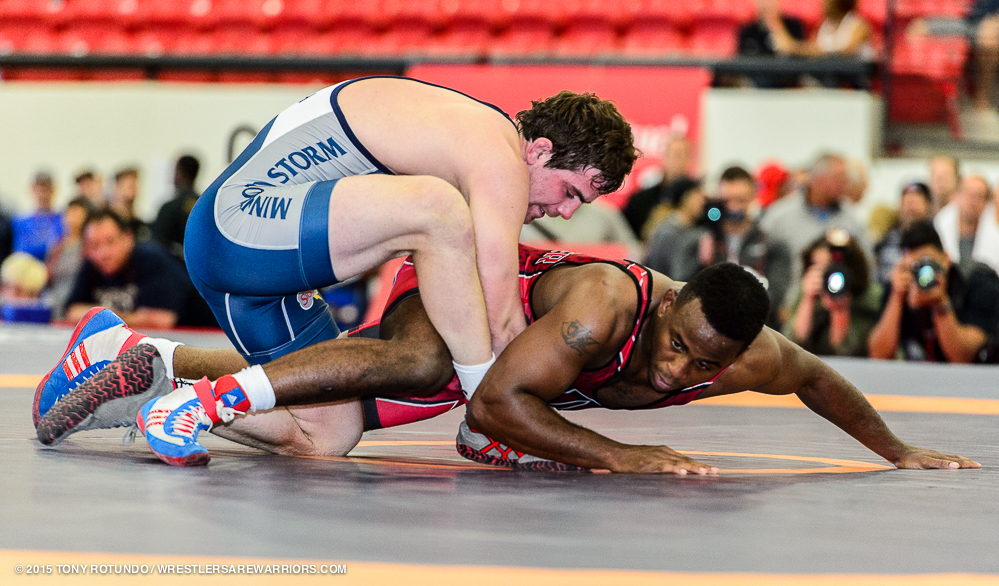
Patrick Smith attempts to lift Harry Lester at the 2015 US Open. (Photo: Tony Rotundo)
Matt Lindland, USA Greco Roman National Team Head Coach, 2000 Olympic silver medalist
“Like I said before, it is what it is. If we want to compete in this style of wrestling, we have to compete with the rule-set that is in front of us. We don’t have a choice. It’s kind of a philosophy of, Can I do something about it, yes or no? And if the answer is “no”, then don’t worry about it. If I can do something about it, then I do. But if there is nothing I can do about it, I move on and don’t worry about it. I figure out how we’re going to adapt and overcome.”
On whether or not the removal of forced par terre is a benefit
“It could be an advantage for the Americans if they take advantage of the opportunity. We got turned in every match at the Olympics and every match we lost because of that. I still feel with the rule change as it is, if we get a takedown, we still have to be good on top. We still have to take advantage of those opportunities if we take somebody down. We can still score on top, that’s important. I don’t think you can forget about par terre defense either, because if you’re Jesse Thielke and you’re taking risks going out there, you’re going to get taken down. I know you’ll get back on your feet and you’ll probably score eight more points, but if you get tech’ed because you got taken down, you don’t have that opportunity.”
How the rule change affects training for the US Senior Greco Roman wrestlers, making wrestling more entertaining, and adjustments
“I don’t think it changes a lot. It might change the amount of time we work in each area. But it’s going to force the world to take more risks and score more points. I mean, we still have to prove that our sport is exciting and compelling and something people want to tune into. If we just go out there and push each other for one-point passivities and push-outs, that is dangerous for our sport. We need to go out there, take hold, go chest-to-chest, lock and go. A lot of focus on back-steps and back arches and kind of re-learning how to throw. I don’t think we’ve thrown a lot. There are some guys who have grown up in a system like the one I grew up in, where you just body-locked guys and saw who could throw further. That was our practice some days, Clinch, somebody throw.
The key point is that we have to take advantage of this opportunity if we want to make it an advantage. We need to get in there and train to take risks and execute throws. And when you take risks, there are consequences to every risk, so you need to spend a lot of times in those positions and get very proficient.”
Momir Petković, USA Greco Roman National Team Assistant Coach, 1976 Olympic gold medalist
“Basically, in my opinion and my logical approach towards wrestling as a combat sport, it never made any logical sense that somebody is giving up their position. This would be like in judo, if they call me for passivity and say that I’m avoiding combat, so they order the other guy to put me in an arm bar or a chokehold, or whatever it is. Or in boxing, they would be allowed to punch me in the chin. Or if you stay on the legs, it’s okay. So the first thing is, it didn’t make sense.
The second thing is that Greco Roman is the classical style of wrestling. At least it was during my time. And we made Greco Roman wrestling’s base to be par terre. Par terre is part of the wrestling. But if you are an Olympic or World champion, you have to know you are capable of scoring points on your feet. Then you can do par terre or whatever you want to do. That’s the logical approach to the sport.”
On the influence of the previous rule-set
“It’s too bad this had been going on for a long, long time, especially the last 12 years, they really killed our sport. They turned it into an ugly, no-action, defensive kind of sport. And then the rule changes back to par terre, everyone was getting 30 seconds in par terre to score and that was it. Even the Russians today, if you watch them, during my time, they lock in any position to see who was going to throw, Let’s go. Nowadays, if somebody has an underhook and they get a little deeper to try to get to the body, they pushing away, they’re running away. We’ve forgotten to wrestle on our feet.”
The sport lost its beauty, it lost its excitement, you know? And it’s going to be very hard, very, very hard to bring it back. The entire Greco family has to be on the same page to raise kids into future champions by using the principles of the way this sport works. So it’s not about how I’m going to stop you from head-locking me and pushing away, or me stopping you from arm-throwing me and pushing away. It is about if you try to headlock me or arm throw me, it’s what is it that I can do back to score on you. Now we’re talking about raising the level of sport and making many more changes. But at least it’s going to be wrestling.”
On adjustments
“It’s going to take time, definitely. It’s going to take down, it’s not going to happen overnight. I mean, this generation of wrestlers lost a lot because they just know defense. They know how to block, how to grab fingers, how to push away when they don’t feel comfortable. And that is totally unacceptable because wrestling is a contact sport. You can’t throw anybody if they are holding you and pushing you away, avoiding contact. Wrestling can be a very beautiful sport if you approach it the right way.”
How it may benefit Americans
“For us, the United States, it’s a much better approach because for par terre, we don’t have a level in this country where we can push each other to raise our level to the Europeans or wherever. We don’t have that, especially in Greco. We don’t have those capabilities to produce that level in par terre, so we’re blocking from par terre. It’s very unfamiliar as far as the rules go in the US.
If you raise your kids to go out there, regardless of winning or losing, in the end, our sport wins. I understand the point that we all want to win our medals and they all want to win their medals. But let’s do it in a way like we are sportsmen. Let’s do it a way where with the rules and the people, everybody is going to talk about wrestling, how nice it is to watch.
We are all just part of this sport, you know? If we are all a part of it, the sport will win. But we have to be part of it the right way. If you start killing it because of our personal goals, slowly but surely, wrestling is going to go away.”
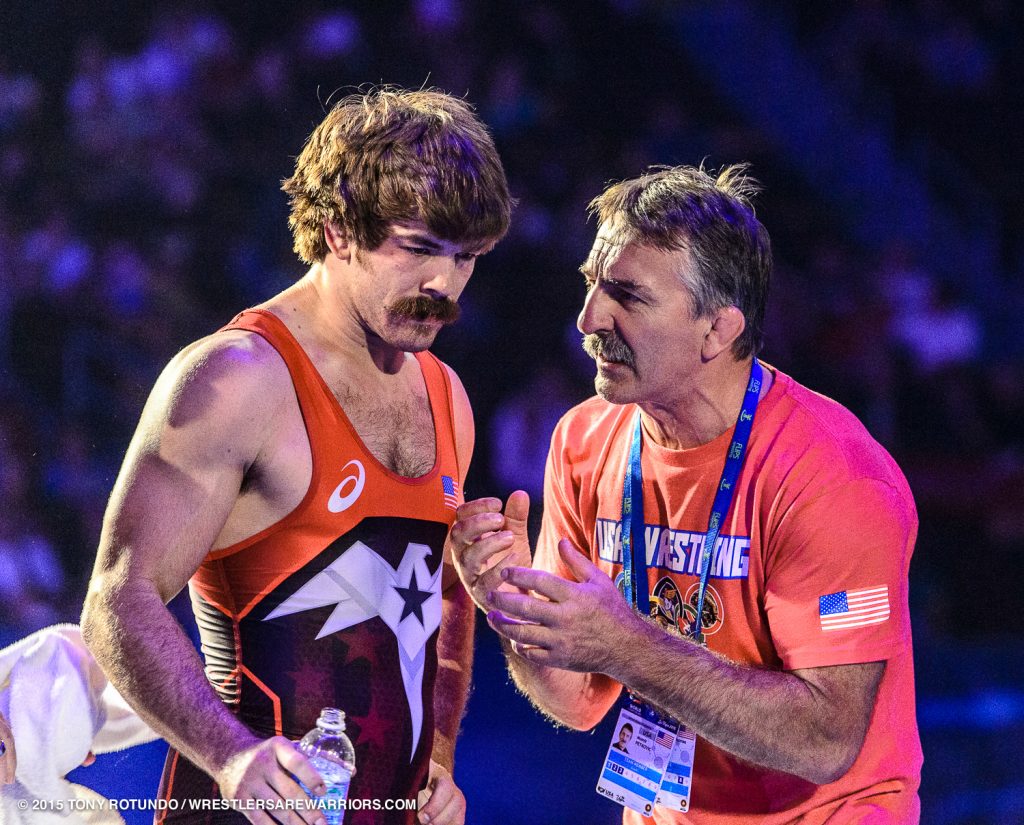
Petković (left) feels that the removal of forced par terre is a step in the right direction to elevate Greco’s status. (Photo: Tony Rotundo)
RaVaughn Perkins (NYAC) – 66 kg, 2016 Olympic Trials Champion
“You know, I’m excited about it. I bet everybody in the US probably feels about the same way. I’m very happy about this rule change. No matter what was going to happen, we would adapt to whatever they decided, but I know a lot of us are really happy about this. It’s really great. It’s good for the US. It’s going to be a great couple of years. Hopefully, they stick to these rules a little bit.”
If there will be a difference in training
“Not too much probably. We’re still going to be working a lot on par terre but not as much as we were probably. But it definitely is.”
General approach versus international opponents
“Go in there and keep doing what I’ve been doing. I was put down once last season, in Turkey, but that was the only time, against Greece. I believe it is going to work in my favor if I stick to what I’ve been doing. I don’t have to change really anything, I’m just going to keep doing what I’ve been doing. Just stick to my game plan.”
Robby Smith (NYAC) – 130 kg, 2016 Olympian, three-time World Team member
“Momir had been pushing for this for years to bring it back to what we had. We had finally gotten it back to where we were still more classical wrestling and we had to keep par terre in there or a little while.
You don’t deserve par terre when it’s given to you as a gift from the referee. It should be two guys going out there competing in the best possible way. Make it like you call it. I’ve told you I call it an art form. Make it an art form, where it’s two dudes going out there to beat the crap out of each other, but make it look awesome, two guys competing to see who has the best skill. Not going out there, stalling for three minutes, and then get rewarded by going on top of a guy.
If it’s a close match, you’re still going to have a referee’s point of view telling you you’re passive and if it’s 7-7, he can give the other guy a point. That is still going to happen. But other than that, I think it’s going to be a pure style of Greco Roman wrestling.”
On the potential benefit for US wrestlers
“I think it benefits all of Team USA Greco awesomely because we’re fighters on the feet, we do most of our damage on the feet and it takes away one of our positions that we might not be the best at and puts it in our favor.”
How the removal of forced par terre might affect training
“I don’t think it will change my approach to training because I’ll train pretty much the same way as if there was par terre, because if there is a chance I could be taken down, I still have to know how to wrestle par terre. But this is going to change my mentality walking onto the mat with not having to worry about the referee putting me down. Instead, it’s about being concerned with another wrestler trying to take me down, where I’m best at, on my feet. And I feel that this is going to raise my confidence level ten-fold and I can’t wait to go out there and wrestle.”

Notice: Trying to get property 'term_id' of non-object in /home/fivepointwp/webapps/fivepointwp/wp-content/themes/flex-mag/functions.php on line 999

